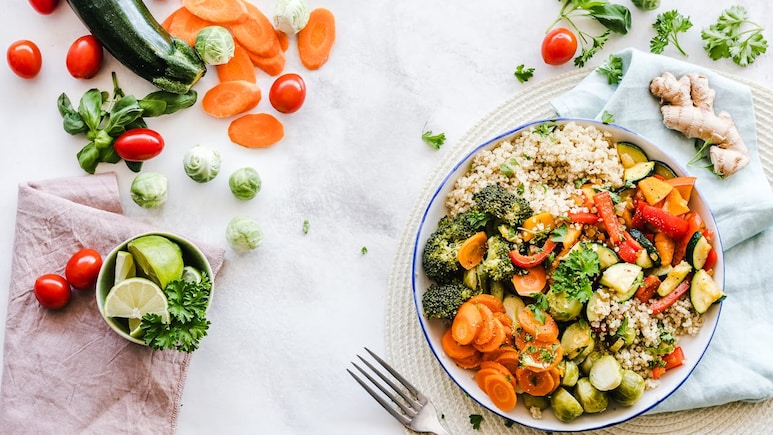
Heart disease continues to be the leading cause of death worldwide, and India is no exception. According to the Indian Council of Medical Research (ICMR), cardiovascular diseases are responsible for nearly one in every four deaths in the country. While genetics play a role, experts emphasise that lifestyle, particularly diet, has a far greater influence on heart health. "In my experience, diet plays a central role in protecting the heart. Decades of research confirm that what we eat directly affects cholesterol, blood pressure, blood sugar, and weight - all major risk factors for heart disease," says Dr Sanjeev Gera, Senior Director & HOD - Cardiology, Fortis Noida. But with social media full of quick-fix plans and "miracle" diets, it has become harder for people to distinguish between sound advice and misleading claims. Dr Gera helps bust myths and explains the essential components of a truly heart-healthy diet. The Facts That Truly Protect The Heart1. Focus on PlantsPlant-based foods should form the foundation of your plate. Vegetables, fruits, and whole grains are rich in vitamins, minerals, antioxidants, and dietary fibre. "These foods help reduce cholesterol levels and maintain a healthy weight," says Dr Gera. Unlike refined grains that spike blood sugar, whole grains like brown rice, oats, and whole-wheat bread provide slow-release energy and aid digestion. 2. Choose Healthy FatsThe blanket fear of fats is misplaced. "Not all fats are harmful. Unsaturated fats, particularly monounsaturated and polyunsaturated fats, play a crucial role in protecting the heart," Dr Gera explains. Sources like olive oil, avocados, nuts, and seeds lower "bad" LDL cholesterol while raising "good" HDL cholesterol. In moderation, these fats reduce inflammation and support cardiovascular function. 3. Incorporate Omega-3sOmega-3 fatty acids are star nutrients when it comes to cardiovascular care. They reduce arrhythmia risk, lower triglycerides, and prevent plaque buildup in arteries. Dr Gera recommends eating fish such as salmon, tuna, or mackerel at least twice a week. For vegetarians, flaxseeds, chia seeds, and walnuts are reliable alternatives. 4. Opt For Lean ProteinsProtein is essential, but the source determines its impact on the heart. "Lean meats, skinless poultry, eggs, legumes, tofu, nuts, and seeds provide high-quality protein without excessive saturated fat," says Dr Gera. These foods support muscle health and satiety without straining the heart. 5. Limit Unhealthy FoodsProcessed snacks, sugary drinks, sweets, and red or processed meats increase cholesterol and diabetes risk. High-fat dairy and cheese should also be consumed sparingly. "Replacing these with fresh, whole options is a major step toward better heart health," Dr Gera advises. 6. Control Sodium And SugarExcess sodium is a silent enemy. Hidden in canned foods and packaged snacks, it raises blood pressure, the leading driver of strokes and heart attacks. Added sugars, meanwhile, contribute to obesity and diabetes. Reading labels carefully can help cut back significantly. 7. Stay HydratedPlain water is your heart's best friend. It supports circulation and metabolism. "Sugary juices, on the other hand, add unnecessary calories and sugar spikes. Whole fruits are always a better option," notes Dr Gera. 8. Cook The Healthy WayEven nutritious foods can lose their benefits if cooked improperly. Baking, steaming, roasting, or boiling preserve nutrients without excess oil. Deep-frying, in contrast, loads food with trans fats and calories that stress the cardiovascular system.  Photo Credit: Pexels Busting Common MisconceptionsThe 3-Day Cardiac DietThis internet-famous diet promises quick results with foods like diet soda, ice cream, and white bread. Dr Gera warns: "Despite its name, this diet has no proven benefits for heart health. In fact, it encourages foods that have no place in a heart-protective lifestyle." All Fats Are BadWhile saturated and trans fats should be limited, unsaturated fats are beneficial. Avoiding foods like nuts or olive oil due to fear of fat is counterproductive. Eliminating All Carbs HelpsCarbs are not villains. Whole grains and complex carbohydrates provide fibre, satiety, and stable blood sugar. "Completely cutting carbs often deprives the body of important benefits," Dr Gera explains. Drinking Fruit Juice Means Fruit ConsumptionEven 100% natural juices are concentrated sugar sources that lack fibre. Whole fruits release sugar slowly, provide satiety, and deliver more nutrients. Alcohol Protects the HeartModerate drinking has often been glorified. But Dr Gera clarifies: "Excess alcohol raises blood pressure, cholesterol, and blood sugar levels-all of which damage the heart. If consumed at all, alcohol should be limited to one or two drinks per week." Heart health is not built on fad diets or extreme restrictions, but on long-term, balanced eating habits. As Dr Gera puts it: "A truly heart-healthy diet is built on balance, variety, and moderation, not on quick-fix plans. By separating facts from misconceptions, individuals can make informed choices that significantly reduce their risk of heart disease and improve overall well-being." The takeaway? Fill your plate with colourful plants, choose good fats and lean proteins, keep sugar and salt in check, and prepare meals mindfully. Protecting your heart is less about the latest diet trend, and more about building everyday habits that last a lifetime. Disclaimer: This content including advice provides generic information only. It is in no way a substitute for a qualified medical opinion. Always consult a specialist or your own doctor for more information. NDTV does not claim responsibility for this information. |
Track Latest News Live on NDTV.com and get news updates from India and around the world

